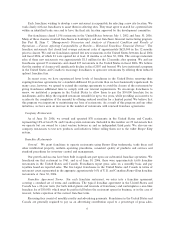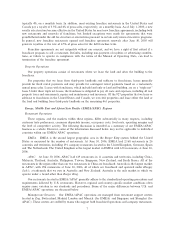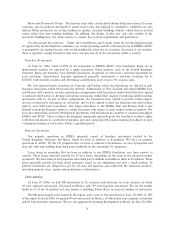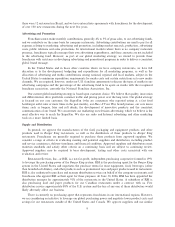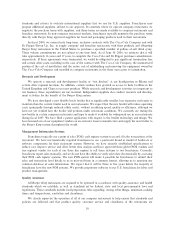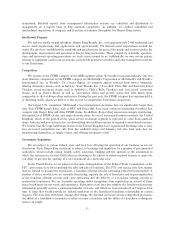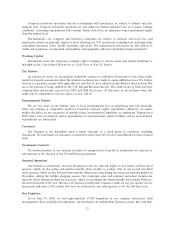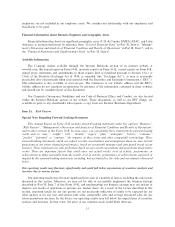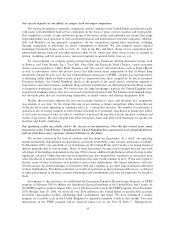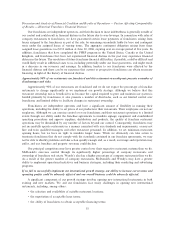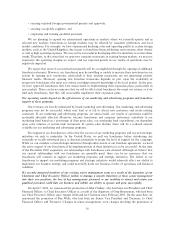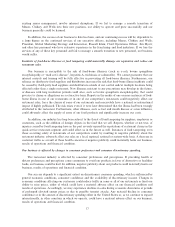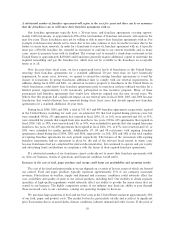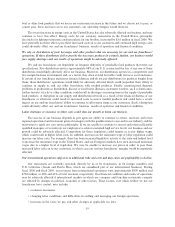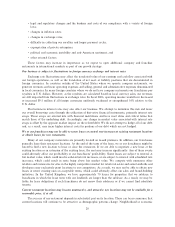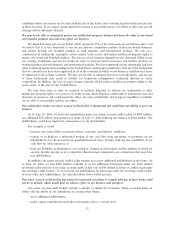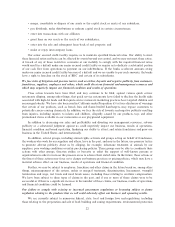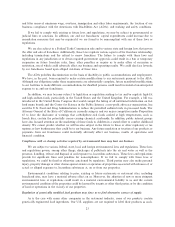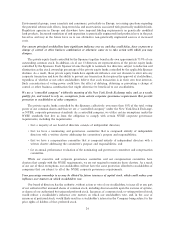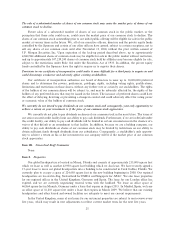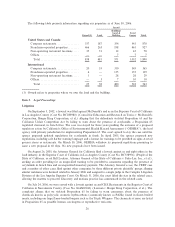Burger King 2006 Annual Report Download - page 28
Download and view the complete annual report
Please find page 28 of the 2006 Burger King annual report below. You can navigate through the pages in the report by either clicking on the pages listed below, or by using the keyword search tool below to find specific information within the annual report.‚ securing required foreign governmental permits and approvals;
‚ securing acceptable suppliers; and
‚ employing and training qualified personnel.
We are planning to expand our international operations in markets where we currently operate and in
selected new markets. Operations in foreign markets may be affected by consumer preferences and local
market conditions. For example, we have experienced declining sales and operating profits in certain foreign
markets, such as the United Kingdom, due in part to franchisee financial distress and concerns about obesity
as well as high operating expenses. We may not be successful in developing effective initiatives to reverse these
trends. Therefore, to the extent that we open new company restaurants in existing foreign markets, we may not
experience the operating margins we expect, and our expected growth in our results of operations may be
negatively impacted.
We expect that most of our international growth will be accomplished through the opening of additional
franchise restaurants. However, our franchisees may be unwilling or unable to increase their investment in our
system by opening new restaurants, particularly if their existing restaurants are not generating positive
financial results. Moreover, opening new franchise restaurants depends, in part, upon the availability of
prospective franchisees who meet our criteria, including extensive knowledge of the local market. In the past,
we have approved franchisees that were unsuccessful in implementing their expansion plans, particularly in
new markets. There can be no assurance that we will be able to find franchisees who meet our criteria, or if we
find such franchisees, that they will successfully implement their expansion plans.
Our operating results depend on the effectiveness of our marketing and advertising programs and franchisee
support of these programs.
Our revenues are heavily influenced by brand marketing and advertising. Our marketing and advertising
programs may not be successful, which may lead us to fail to attract new customers and retain existing
customers. If our marketing and advertising programs are unsuccessful, our results of operations could be
materially adversely affected. Moreover, because franchisees and company restaurants contribute to our
marketing fund based on a percentage of their gross sales, our marketing fund expenditures are dependent
upon sales volumes at system-wide restaurants. If system sales decline, there will be a reduced amount
available for our marketing and advertising programs.
The support of our franchisees is critical for the success of our marketing programs and any new strategic
initiatives we seek to undertake. In the United States, we poll our franchisees before introducing any
nationally-or locally-advertised price or discount promotion to gauge the level of support for the campaign.
While we can mandate certain strategic initiatives through enforcement of our franchise agreements, we need
the active support of our franchisees if the implementation of these initiatives is to be successful. At the time
of the December 2002 acquisition, our relationships with franchisees were strained. Although we believe that
our current relationships with our franchisees are generally good, there can be no assurance that our
franchisees will continue to support our marketing programs and strategic initiatives. The failure of our
franchisees to support our marketing programs and strategic initiatives would adversely affect our ability to
implement our business strategy and could materially harm our business, results of operations and financial
condition.
We recently promoted members of our existing senior management team as a result of the departure of our
Chairman and Chief Executive Officer; failure to manage a smooth transition of those senior management
into their new positions, the loss of key management personnel or our inability to attract and retain new
qualified personnel could hurt our business and inhibit our ability to operate and grow successfully.
On April 7, 2006, we announced the promotion of John Chidsey, who had been our President and Chief
Financial Officer, to Chief Executive Officer as a result of the departure of Greg Brenneman, who had been
our Chief Executive Officer since August 2004 and our Chairman since February 2005. On the same date, we
announced the promotion of Ben Wells, who had been our Senior Vice President and Treasurer, to Chief
Financial Officer and Treasurer. Changes in senior management, even changes involving the promotion of
16


